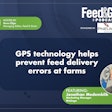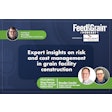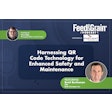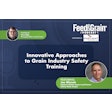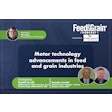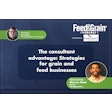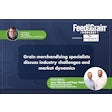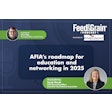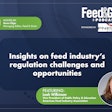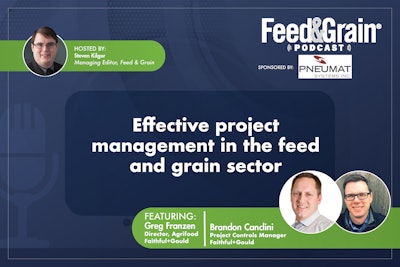
In this episode of the Feed & Grain Podcast, host Steven Kilger interviews Greg Franzen and Mark Herbert from Faithful+Gould, a global consulting firm specializing in agribusiness construction projects. The experts emphasize the importance of creating a comprehensive project charter to establish clear objectives and responsibilities. They also stress the value of documenting and implementing lessons learned from previous projects to improve efficiency and mitigate risks. The discussion provides valuable insights for feed manufacturers and grain handlers embarking on construction projects, highlighting the benefits of seeking outside expertise and maintaining thorough documentation throughout the process.
Steven Kilger - 00:00
Hello! My name Steven Kilger, I’m the managing Editor for Feed & Grain Magazine and the host of the Feed Grain Podcast. Thank you so much for joining me today as we dive deep into the issues affecting the Feed Manufacturing, Grain Handling and allied industries.
Today’s episode is brought to you by The BinWhip from Pneumat Systems. The powerful Dual Impact BinWhip removes the toughest buildup and blockages in industrial storage silos – without hazardous silo entry. Learn more today at binwhip.com.
Today my guests are Greg Franzen and Mark Herbert from Faithful+Gould, a global consulting firm specializing in agribusiness construction projects. We talk about how companies can best handle large building projects to make sure everything goes smoothly and finishes on time.
I hope you enjoyed the interview. If you want to help out with the podcast and are listening to this in a podcasting app, please rate us and subscribe. If you're listening online, sign up for the Feed & Grain newsletter — Industry Watch. That'll help you see when new podcasts drop and help you stay up to date with all the news from around the industry.
Now, onto the show.
Kilger - 01:03
Hi Greg and Bart, thanks so much for coming and talking to me today. I first saw you guys at this last year's GEAPS Exchange where you gave a really great talk about all the particulars that go into making a plan for a new build, new greenfield, new construction and how get all that put together so everyone at the end of the process everyone is hopefully as happy as they can and everything is as close as possible. I covered a lot of construction processes and they never exactly go what you have down on paper.
Greg Franzen - 01:32
There's always some form of change. Most of the success of a project is how your team is able to deal with change.
Kilger - 01:40
Yeah, definitely. Before we get too far ahead, can you guys tell me what you do? You work for a company called Faithful+Gould, which is construction consulting company, correct?
Franzen - 01:50
Yeah, Faithful+Gould is a global consulting firm. It's 99.9% of the time we sit on the side of the client in construction project. And so we serve as that independent third party client advocate. And so our mission is really to help the client maximize their interest in their capital project. So that's what we do.
Kilger - 02:14
What do you guys specifically do for the company?
Franzen - 02:17
I'll let you introduce yourself and your role.
Multiple speakers - 02:20
Yeah, thanks.
Mark Herbert - 02:21
My name is Mark Herbert. I am a planning and scheduling professional through the Association for the Advancement of Cost Engineering. I am a professional construction engineer in the state of Minnesota. I help client build things, but the reality is that we plan and schedule and manage costs for a large infrastructure project. In this particular case, I'm more focused on the agriculture or industrial agriculture sector and this podcast. So whenever they have a large fertilizer production facility or wastewater treatment plant for ethanol production and many of those type of things are grain transfer facilities. These are millions and millions and millions of dollars.
I try to step in and help the client manage the process where they know what they want at the end, but how do you get to the end? How do you take the keys and unlock the door and walk into the facility? I walk with the client through that process on who they're hiring, when they're hiring, when they're building, when they're constructing, when they're designing and all that fun.
Franzen - 03:27
My name is Greg Franzen, Mark and I both sit in the Minneapolis office and I oversee our agri-food project work in the US. Agri-food includes agri-business projects for clients that typically participate in GEAPS and also food manufacturing. That's my role in the company. Our mission is to be flexible and help clients where they need help, whether that's fill and gap For resources or providing a team of people to help or providing a cost estimate and so that's sort of what we do in the agri-food sector.
Kilger - 04:00
I've interviewed a lot of facility managers, regional managers, that kind of thing and feed and grain handling and while a lot of them get pushed to the forefront of these big construction projects, it's not usually their normal job. It's usually such a big thing that doesn't happen often. It's really nice to hear that you're here to help them with something they probably will only do once or twice in their career and also don't have a ton of experience with.
Franzen - 04:27
That's a good point. Many times we work for clients and their operations director might be responsible for a very large project in addition to their day job. It puts a tremendous load on people. Our objective is to support people through implementing good construction processes to help them be successful in delivering their project. Really, you're leading into one of the first items we wanted to talk about, which was a project charter. What is a project charter?
Kilger - 05:03
During your presentation at Jeeps, you mentioned project charter and those initial steps of initiating it. So for our listeners that might not know or have experience with that, can you explain what project charter is and why it's an important part of overall construction process?
Franzen - 05:19
The project charter is the initial depth in the formation of a project. It sets the baseline for what the need is, what's the business case, and how do we achieve that need in business case through a project. Company leadership should really appoint an internal sponsor. That has the authority and responsibility to initiate the development of that project charter. And really the purpose of the charter is to provide company authorization for the expenditure of resources on the project. It should include the name and description of the project, the sponsor and the project manager who would be responsible for the project. It should include some of the other project team members, provide a brief description of the business case, to define the general scope of work, the expected goals, objectives and deliverables of the project.
Franzen - 06:17
You would also want to include some project milestones like start date, completion date and then identify project risks or constraints that may exist. That's really a pretty quick overview. Project Charter doesn't have to be complicated but does need to be somewhat comprehensive.
Kilger - 06:37
Yeah, it's really important, especially with the way ag organizations are often deconstructed. A lot of them are co-ops, which have boards that make the final approval. This lets both sides of the contractor and the company know who's in charge on the day-to-day stuff without that board approval.
Franzen - 06:54
Am I getting that It's really meant to be mostly an internal document for the business to come together and agree on. Typically boards of directors are approving large projects and so the charter will be something that board level would review and approve and agree to or comment on. So it's that initial document to say, okay, initially this seems like a good idea. We'll provide funding up to a certain value until you take it to this next stage. The charter gets you started.
Kilger - 07:27
Very interesting. During your presentation, the thing I found really interesting is, especially for companies that have a lot facilities and may have done this more than once, can you talk a little bit about the importance of documenting and implementing the lessons learned from the previous projects? I found that really fascinating part of your original presentation.
Franzen - 07:47
I think Mark and I are going to tag team on this one, but I'll take the first stab at that. From Lessons Learned, we all understand what lessons learned. From the time you're a little kid, you might put your hand on the hot stove once and hopefully that's a reminder not to do that again because it hurt. All of us that have that built into us experience is one of the best teachers and capturing lessons learned is simply an organized method to capture those lessons that we've learned through the course of the project, document them and then store them in a way that can be easily pulled up by many others so document management is really important, having good document management and communicating to others in the business where these lessons learned are and then also Applying the lessons learned to the appropriate time in project development. The experience out of our head onto paper and more appropriately documented electronically so that we can share that experience with others and others can benefit from the experience we all have. And so it's getting the information out of our head so that we have it digitally and Storing the information in a centralized location like in a SharePoint and making it available to others that have projects and coordinating the naming convention, what type of lessons learned does it have to do
With electrical systems, mechanical systems, DIVL, organizing it in a proper way and then implementing it on new projects. At the beginning of a project would be a good time to review lessons learned from previous projects. During the design engineering kickoff, value engineering workshops, procurement and construction kickoff, and project closeout. All those steps need to work together to apply lessons learned. Mark, you had another thought here on mediation arbitration.
Herbert - 09:50
Is it important? Unfortunately, claims happen a lot in projects for one reason or another and so you wind up going through mediation, arbitration, God forbid litigation. Having the documentation for current projects so good because the legal proceedings and things often happen years after the process is already done. So even then. Details are lost at the time, so capturing are very important just for that, but then taking a step further and talking about... from one project to the next, understanding how long certain scopes took in durations, how many people it took, whatever you want to measure to complete the project. When these arguments start to rear their ugly head, you might have a better footing on, hey, the plan is right and the execution is wrong because when you don't have the documentation and what we've learned coming in from older projects, It becomes an argument of, hey, maybe the plan was flawed and
our execution was good.
Herbert - 10:55
And so through the, the document station will have to learn, support the idea of the owner saying, read a good plan, it was your execution that didn't happen. That's kind of speaking to the importance of documentation and implementing weapons. Another one, Greg was mentioning it earlier, about passing the knowledge down. Throughout human history, a lot of it's been verbal and oral traditions. They have to answer people at kind of the same year where you're looking for the most experienced people when starting projects. And I'm not saying that in fact that's very good to do, but alongside we should be looking for also the most experienced documentation of the project and coupling those two. I'm not saying that knowledge is a substitute for human experience because the knowledge, but it will shore up the ideas of having experienced people with historical knuckle-edge out that makes sure a complete picture for project planning and just make things fail.
It's like night and day when you're going through the process once you have that foundation to come off of. The idea that people come and get I know everybody says, well, it's just people are changing jobs all the time these days. Well, I've been around long enough to know that that's kind of the way it's always been. And so having the documentation allow you, whether you get those experienced people or not, still lets you transfer that knowledge.
Kilger - 12:22
It's a good reminder for anyone starting project too, because it's such an easy thing to forget, right? Anyone who's been involved with a big project where you have so much going on, it's easy to forget tell yourself you're going to do later and then completely forget to But it comes up all the time. I mean, my experience is with magazine issues, right? We have a really good documentation system and goodness we did, because you never know what's going to come up. Just today, someone was asking me for an article from 2017 that I had come in front. Without that, we wouldn't be able to respond.
It's something we don't think about, especially when you're starting a big project, but such an important part of that people need to be reminded on that.
Hey everyone, this is Steven again. My conversation with Greg and Mark went really long, so we're splitting it into two podcasts. But in good news, you won't have to wait very long.
Stay safe out there and the podcast will be back very soon..
.jpg?auto=format%2Ccompress&crop=faces&fit=crop&h=48&q=70&w=48)






